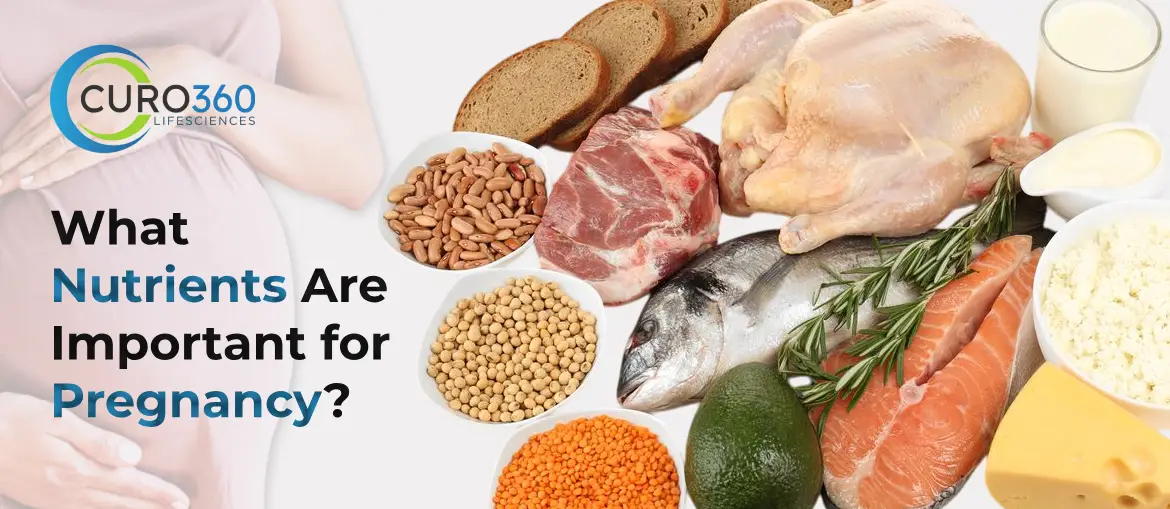
Pregnancy is a special time when a woman’s body undergoes significant changes to support the growing baby. Proper nutrition is essential during this period for both the mother and the baby. A well-balanced diet ensures that the baby develops properly and that there are no complications during pregnancy. The body’s demand for certain nutrients increases during pregnancy, including folic acid, protein, calcium, iron, and omega-3 fatty acids, as they play an important role in fetal growth and maternal health. A deficiency in any of these nutrients can lead to complications such as weak bones, digestive issues, birth defects, etc. Pregnant women must consume nutrient-rich foods or supplements to meet the increased requirements. Along with a proper diet, regular check-ups also ensure that the mother and baby stay healthy.
Some of the Important Nutrients Are:
1. Folic Acid
Folic acid, also known as vitamin B9, is one of the most important nutrients during pregnancy. It helps in the development of the baby’s neural tube, which later forms the spinal cord and brain. A deficiency of folic acid can cause serious birth defects. Folic acid should be consumed daily and is found in green leafy vegetables, beans, citrus fruits, etc. Since diet alone may not provide the required amount of folic acid, folic acid supplements are often recommended during the first trimester. In addition, women who are trying to conceive should also start taking folic acid to prepare their bodies for pregnancy.
2. Iron
Iron is vital during pregnancy as it helps produce haemoglobin, which carries oxygen to the baby. Since blood volume increases during pregnancy, iron requirements also rise to prevent anemia. Low iron levels can lead to fatigue, dizziness, and an increased risk of premature birth. Pregnant women need around 25 mg of iron daily, and some iron-rich foods include spinach, lentils, beans, and lean meat. Consuming vitamin C-rich fruits like oranges and tomatoes can also improve iron absorption. Regular check-ups are essential to ensure that iron levels remain sufficient.
3. Calcium
Calcium is important for the baby’s bones, teeth, heart, and muscle development. If a pregnant woman does not consume enough calcium, her body will take it from her bones, increasing the risk of osteoporosis later in life. Dairy products like milk, yogurt, and cheese are the best sources of calcium. Other sources include almonds and green leafy vegetables. Getting enough calcium helps prevent bone-related issues and supports the baby’s skeletal growth. If dietary intake is insufficient, supplements may be needed to maintain the balance.
4. Protein
Protein is important for the growth of the baby’s muscles, organs, and tissues. It also plays a key role in the development of the placenta, which provides oxygen and nutrients to the baby. Some good sources of protein include eggs, dairy products, tofu, lentils, and beans. Eating a variety of protein-rich foods ensures an adequate supply of amino acids, which are the building blocks of life. Protein helps maintain maternal muscle health and supports a healthy pregnancy weight.
5. Omega-3 Fatty Acids
Omega-3 fatty acids, especially DHA (docosahexaenoic acid), are vital for the baby’s brain and eye development. These healthy fats support the nervous system and help reduce inflammation. Plant-based sources include chia seeds, walnuts, and flaxseeds, while fatty fish like salmon and mackerel are also excellent sources. However, since some fish contain high mercury levels, it is important to choose safe seafood options.
A nutritious diet is essential during pregnancy and should include folic acid, calcium, iron, protein, and omega-3 fatty acids to support the growth of both the mother and baby. Each nutrient plays a vital role, from brain formation to bone health. Ensuring a well-balanced diet and regular medical check-ups will help maintain a healthy pregnancy and prevent complications.
